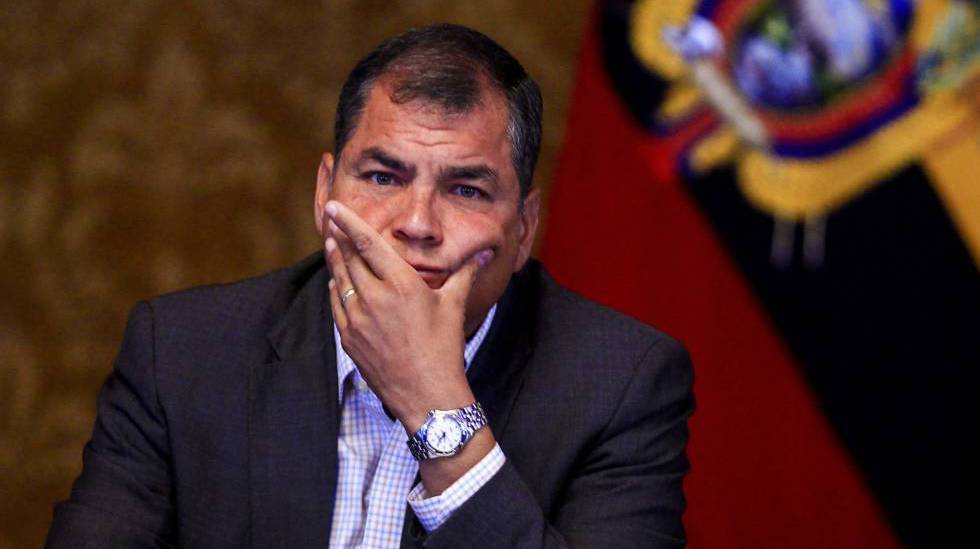By Mamela Fiallo
The complicity between 21st-century socialism and the Chinese communist regime suffered a new blow.
The US Department of Justice revealed a 20-page report exposing the largest corruption scheme in the history of Ecuador.
In addition to the governments negotiating foreign debt in exchange for US$1.3 billion, the report revealed the companies involved, the value of the bribes, and the bank transfers.

Two Petroecuador officials allegedly transferred US$70 million to bank accounts in Switzerland, the Cayman Islands, and Panama.
In exchange, Petroecuador officials allegedly split the US$15 million they received as payment.
Ecuadorians would have been harmed for an average of US$4.7 billion over seven years: from 2010 to 2017.
Such figures could not have been handled without the knowledge of high-ranking officials of the government in office, starting with Rafael Correa.
Using a decree, he handed over Ecuador’s subway resources in exchange for forgiving the foreign debt with China.
The damage figure rises as the contract is made at a lower price than the market. Thus, Ecuadorians were affected, and China benefited.
The local media point to the State as the damaged party, but the reality is that the State is supported by its citizens.
Therefore, the real affected are the Ecuadorians, not an entity that produces nothing.
ONE ACCUSED AND ONE ARRESTED IN THE US FOR BRIBERY PAYMENTS
The US has been following the case closely since April 2021, when an employee of the intermediary Gunvor pleaded guilty to paying bribes to Ecuadorian authorities linked to oil.
It involved kickbacks in Ecuador, so he turned himself in to Ecuadorian authorities.
“I know what I was doing was wrong and illegal,” Raymond Kohut told a judge as he pleaded guilty. He could face up to 20 years in prison.
US authorities have already detained Nielsen Arias, who personally traveled to China as manager of International Trade for Petroecuador, a state-owned company.
Arias was allegedly in charge of coordinating favorable conditions for the intermediaries. So far, Arias is linked to at least three corruption schemes.
And he allegedly received US$20 million in exchange for the bribes.
Arias “participated in an international bribery and money laundering scheme in which he knowingly, willfully, and corruptly accepted and agreed to bribes made by and on behalf of energy and asphalt trading companies,” the Justice Department reports.
“In exchange for using his official position and influence, and securing improper advantages, to assist the companies in obtaining and retaining business with and related to Petroecuador,” it adds.
So far, the case involves the courts of at least four countries: the USA, Ecuador, Uruguay, and Peru.
During Arias’ administration, Petroecuador signed contracts with five international state-owned companies in Asia, the Middle East, and Latin America. The contracts did not go through a bidding process.
Arias, who appears as ‘El Gordo’ in the report, had authority over oil derivatives, liquefied gas, and asphalt contracts.
According to the investigation, Arias used paper companies in Singapore, Portugal, Panama, and the United States.
NOT ONLY CHINA GOT RICH AT THE EXPENSE OF ECUADORIANS
So China would not have been the only beneficiary. In addition to delivering subway resources to Petrochina, Unipec, and Petrotailanda in exchange for debt, during the socialist period, Correa’s government made deals with three state-owned companies in Asia, one in Latin America, and one in the Middle East.
The network is wide. There is currently a list of names of Ecuadorian officials who would have participated. It starts at the top of power.
Correa’s finance ministers, Fausto Herrera and Patricio Rivera, requested the loans. Then the role of the then Minister of Hydrocarbons, José Icaza, is highlighted. Likewise, Correa’s representative, Jorge Wated.
Also, the representative of Senplades (National Secretary of Planning and Development), Adolfo Salcedo, and the Manager of Petroecuador, Pedro Merizalde, among others.
The New York Prosecutor’s Office delivered these names to its Ecuadorian counterpart. The “actions of the case” are already underway by Ecuadorian legislators from various benches, headed by Assemblyman Fernando Villavicencio.
With Correa out of power, it was possible to imprison his former vice president Jorge Glas for corruption in the administration of his successor Lenin Moreno.
Now there is a lack of political will on the part of Guillermo Lasso to pursue justice.
With information from Gaceta

